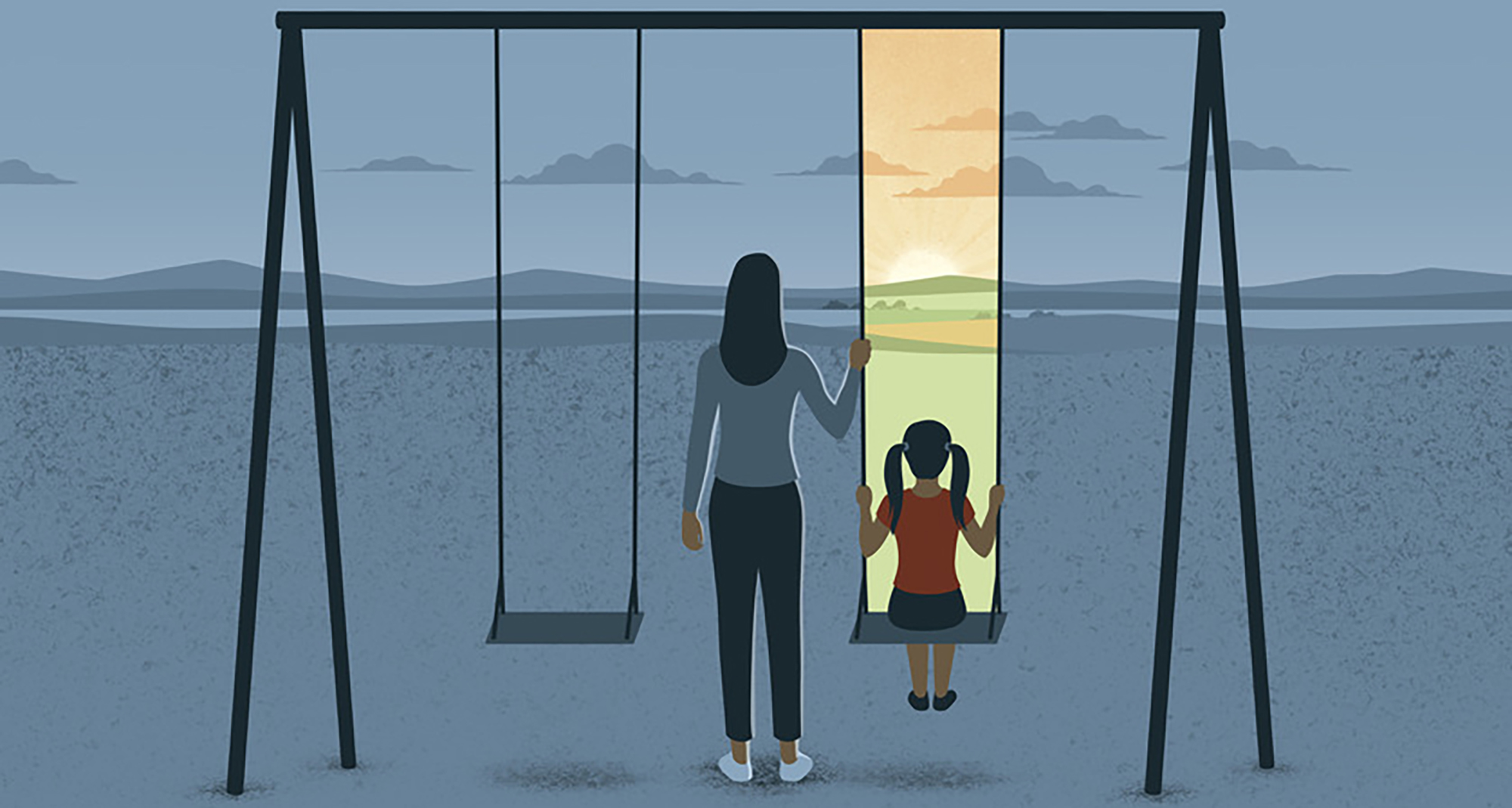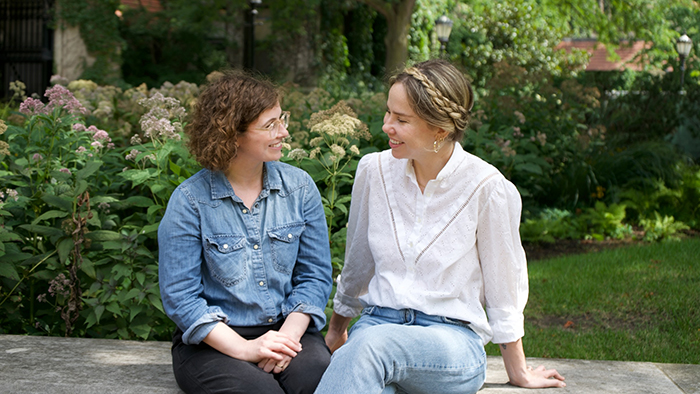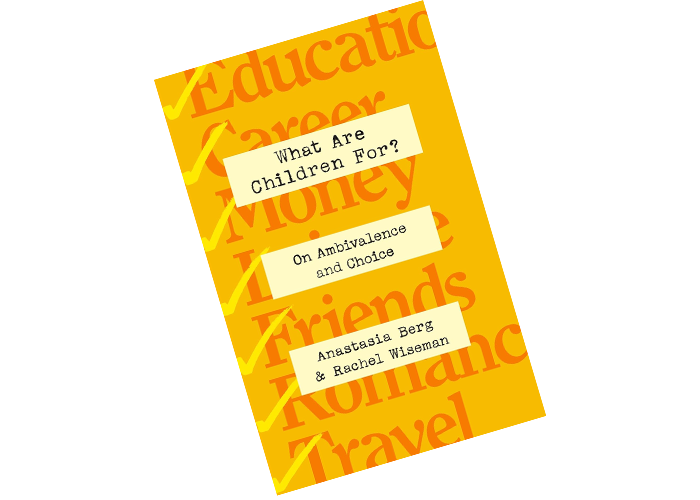
Many millennials aren’t sure about having children. A new book examines why.
So many parents of young children feel guilty, Anastasia Berg, AM’13, PhD’17, is saying. For millennials, having kids can feel like shopping at Amazon, she quips: “I know I shouldn’t, but it was convenient. I really wanted to.” The audience laughs.
The first-floor seminar room in the Classics Building is packed with students—standing at the back, sitting on the floor. They’re here to listen to Berg and Rachel Wiseman, AB’12, talk about their book What Are Children For? On Ambivalence and Choice (St. Martin’s Press, 2024). The event is an October meeting of Night Owls, the philosophy discussion series that’s popular with undergraduates. Agnes Callard, AB’97, associate professor of philosophy, is its host.
What are children for, anyway? Why would anyone choose to have kids, when it’s no longer an assumed part of adulthood? When it’s not just a choice, but a vexed choice that makes you vulnerable to moral judgment—both your own and others’? These are just a few of the questions that Berg and Wiseman consider in their book.
What Are Children For? is not a light read. For a book about parenting, there is a distinct lack of bullet points, sidebars, or homespun advice. There is plenty of data, philosophical argument, and analysis of the “motherhood ambivalence literature”—books, like Elena Ferrante’s The Lost Daughter, that show just how unfun and depleting kids can be.
The language is unapologetically academic. Just one example: Having children means “radically reconfiguring your existing material and professional priorities and your relationship to leisure, to your existing family members, to time itself.” The “sources” section is 21 pages long; among the A’s you will find the American Academy of Matrimonial Lawyers, Hannah Arendt, Augustine, and Jane Austen.
Perhaps surprisingly—given the book’s controversial topic and rigorous philosophical examination of it—the reviews of What Are Children For? have been a publicist’s dream: “lucid and sophisticated” (The Atlantic), “striking and provocative” (Christianity Today), “quietly incendiary” (The New Statesman), “an engaging, literary investigation” (The New Yorker), “subtle and sophisticated” (The Wall Street Journal), “smart, fascinating” (The Washington Post).
In addition to the reviews, the book has been excerpted in The Atlantic, The Cut, and Lithub. Berg and Wiseman have been interviewed on television, radio, and podcasts. They’ve spoken at Northwestern University, the University of Oxford, Swarthmore College, Wheaton College, and more.
Back at the UChicago event, Callard poses a question about anti-natalism. She has a friend who’s an anti-natalist—someone who “thinks that human life is not worthwhile, not worth perpetuating.” Nonetheless, this friend has children. This gets a laugh from the room, Berg and Wiseman included.
“She feels very guilty towards her children, and very angry towards her parents for having her,” Callard says. Her questions for Berg and Wiseman: “Is it wrong for an anti-natalist to have kids? Are there any wrong reasons to have kids?”
Wiseman offers “kind of an indirect response.” She mentions something the late filmmaker David Lynch once posted on X, in the context of his emphysema diagnosis: that he had “loved every minute of smoking,” she says. It was an aesthetic decision, a way of life. “A better way to be an anti-natalist with kids, instead of suffering in the sin, would be to embrace it aesthetically.”

Wiseman and Berg, who are best friends, met in 2016 while working on The Point, “a magazine of the examined life.” The Point was founded by three students in the John U. Nef Committee on Social Thought: Jon Baskin, AM’12, PhD’16; Jonny Thakkar, AM’13, PhD’13; and Etay Zwick, EX’14.
Wiseman is The Point’s managing editor and one of its seven editors. Berg, now an assistant professor of philosophy at the University of California, Irvine, is also an editor.
The Fall 2019 issue included a collection of six essays—a “symposium” in the parlance of The Point—called “What Are Children For?” (Among the essays was Callard’s “Half a Person.” A mother of three, she found herself unexpectedly pregnant with a fourth. Callard asked various people if she should have an abortion, including “a conference room full of philosophers,” she writes. The philosophers avoided even engaging with the question.)
Berg and Wiseman collaborated on the introduction to the issue, “On Choosing Life,” which centered on the millennial angst over having kids. “Are we hesitant to bring new life into the world because we are more morally upright than previous generations, or because we are more selfish?” they write. “The interesting thing is … that we’re asking why in the first place.”
“We were very pleasantly surprised by the reception that the piece got,” Wiseman recalled in a Zoom interview. “It was one of the most popular pieces on the website.”
But their 3,000-word essay had just scratched the surface. Berg suggested they write an entire book. Wiseman’s response: “We can do that?”
They could do that. They wrote a proposal, found an agent, and signed their book contract on March 8, 2020. They had taken the subway to their agent’s office; by the time the meeting was over, New York’s entire subway system had been shut down.
The pandemic would disrupt their writing plans too. Berg was supposed to be a Mellon Postdoctoral Fellow at the University of Pennsylvania. It fell through. So she took a job as an assistant professor of philosophy at the Hebrew University of Jerusalem. (Berg’s CV, pockmarked with lectures canceled due to COVID or war, is a testament to the instability that makes people question the morality of having children.)
Wiseman and Berg wrote the book over Skype, working around the eight-hour time difference. Berg was teaching full time and had a small child. She would meet with Wiseman at the end of her day, with a shared online document open, and they would tussle over the draft, sentence by sentence. Once Berg asked her daughter what she did for work. “You talk to Rachel,” Lila said.

The first chapter of What Are Children For? deals with what the authors call “externals”: real-world factors in the decision to have kids or not, like money, a partner, childcare. But birthrates are falling all over the world, Berg and Wiseman point out, even in countries with pro-family policies. They cite an astonishing 2023 survey: Only 26 percent of Americans said having children is an important part of a fulfilling life, while 71 percent said an enjoyable job or career was a must.
For those who do want children, Berg and Wiseman identify an unexpected external that works against it: “slow love,” a term coined by anthropologist Helen Fisher to describe the tentative, time-consuming style of dating that is now common. “Wanting to start a family and conveying this to prospective partners is … perceived as a liability on the dating market,” Berg and Wiseman write. “To date authentically—naturally, organically, traditionally—one must suppress the desire to have kids. This is a peculiar idea.”
In the final chapter, “To Be Or … ?” they mull over anti-natalism. “‘One cannot bring children into a world like this,’” the chapter begins. “‘One cannot perpetuate suffering.’” It’s a quote from Virginia Woolf’s Mrs. Dalloway about the impossibility of having children in the aftermath of World War I. “As unprecedented as our contemporary existential crisis might seem,” Berg and Wiseman write, “its roots run deep.”
They identify two basic anti-natalist arguments. One, the world is too terrible for children. Two, human beings are too terrible to exist, period. (In passing, Berg and Wiseman note that while Jesus heals all kinds of ailments in the Gospels, he never helps a woman conceive.) Their nuanced discussion of both threads of argument eludes easy summary. But at the end of the book—as in their original 3,000-word essay—they arrive at a position of “affirming life,” whether you choose to have children or not: “Most of us,” they write, “treat our lives not only as valuable but as precious.”
Bookending the dispassionate, analytical middle of the book are two deeply personal essays: the introduction, “Under Pressure,” written by Wiseman, and the conclusion, “Hello from the Other Side,” by Berg. Wiseman, pregnant by the time the book was published, writes frankly of her own childhood: “What would a happy family look like? When I blinked, I couldn’t picture it.”
Berg, who now has two children, describes the exasperating moments of parenting in a way that reads like a picture book: “Pajamas off! Pajamas on! New socks, night socks, no socks. Yes hat, no hat, always hat, not that hat. … Hug, hug, hug!”
Less humorously, “After an extended period without childcare, even grading can feel like a form of self-care,” she writes. “‘Boredom’ is as good a name as any for the distinct irritation that I experienced for much of the time” that she spends with her daughter Lila. Nonetheless, the book is dedicated to her.
What Are Children For? was rushed out in June 2024, with the intention of hitting the market well ahead of the presidential election. But once J. D. Vance’s 2021 remark about “childless cat ladies” resurfaced, the book was sucked into the vortex. In the heated, overly simplistic debate that ensued, What Are Children For? was labeled pronatalist.
Meanwhile, their publicist’s dreams continued to come true: Berg and Wiseman’s deeply serious book was mentioned on The Megyn Kelly Show, during an episode featuring Vance. Kelly name-checks the book and its authors—“leftists, liberals,” she says, sounding incredulous, who “chastised their own side for the reluctance to have children.”
She then reads an excerpt from their New York Times guest essay: “The question of children ultimately transcends politics. … Is life, however imperfect and however challenging—however fraught with political disagreement and disaster—worth living?”
Vance nods, looking serious. “What brings the most meaning to life is family,” he responds, “not all these weird little accomplishments and degrees.”
Around the same time, on their YouTube channel, pronatalist influencers Malcolm and Simone Collins dunked on What Are Children For? in an episode titled “The Progressive Pronatalist Book that Broke My Wife.”
“I read this book. It included things like literary analysis,” Simone Collins says, while managing a fussy baby with admirable aplomb. “This is clearly why we’re not convincing any progressives. We forgot the literary analysis.”
Feminist critic Moira Donegan piled on too. Berg and Wiseman’s thinking was “loftier and more philosophical” than “right-wing pronatalists like Elon Musk and J. D. Vance,” Donegan writes in Bookforum. Yet their claims were essentially the same: “that motherhood is superior and childless lives are comparatively impoverished.”
Berg responded with a long thread on X, pointing out that Donegan had misunderstood the book and misstated the authors’ views on motherhood: “As for the suggestion we ‘pity’ the childless, it is beneath contempt.”
The central argument of What Are Children For? is not pronatalist, Berg continued, but rather “anti-anti-natalist, meaning that it is not meant to convince anyone that they must have kids, but rather show that it is ethically permissible to have them at all.”
At the Night Owls event in October, there’s a break for cookies, then a question and answer session. The second question of the evening (posed, incidentally, by the Magazine’s soft-spoken Metcalf intern, Shiloh Miller, Class of 2026): What obligations do children have to their parents?
“To obey them,” Berg says sternly, “without questioning.” Wiseman and Callard laugh; it takes the students a moment to register the joke.
“I do think that there’s a responsibility to return some of the care that you received,” Wiseman says, slowly and thoughtfully, “when your parents get old and vulnerable.”
“I find this question very hard,” Callard adds, “because I think my parents think I owe them a lot more than I think I owe them. And maybe they’re right.” In a later Zoom interview, Berg recalls how something like “10 more hands” shot up after that question was asked. The Night Owls audience was one of the youngest she and Wiseman had ever spoken to, “and suddenly the conversation went to a place it never went before.”
The book’s title is flipped on its head. Student after student wants to know about the relationship of children to their parents: At a time when children are allowed to divorce their parents, what ethical responsibilities does a parent have to their children? Do you have an obligation to your parents even if they are imperfect? Do you have an obligation to them if you have a bad relationship? In parent-child relationships, is there a greater obligation to forgive than in other relationships?
“I thought there’s supposed to be fewer questions as we go through,” Berg observes after an hour of Q&A.
“A lot of you are sticking around for this one,” Callard adds. But the questions keep coming, until Callard shuts down the event a little past 10 p.m. Over and over, the students are asking the same question, though in different words: What are parents for?
